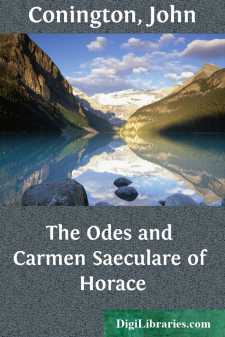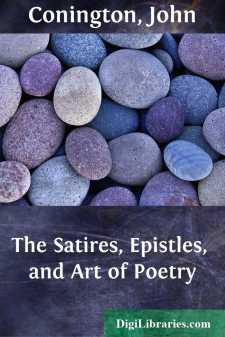Categories
- Antiques & Collectibles 13
- Architecture 36
- Art 48
- Bibles 22
- Biography & Autobiography 813
- Body, Mind & Spirit 142
- Business & Economics 28
- Children's Books 17
- Children's Fiction 14
- Computers 4
- Cooking 94
- Crafts & Hobbies 4
- Drama 346
- Education 46
- Family & Relationships 57
- Fiction 11829
- Games 19
- Gardening 17
- Health & Fitness 34
- History 1377
- House & Home 1
- Humor 147
- Juvenile Fiction 1873
- Juvenile Nonfiction 202
- Language Arts & Disciplines 88
- Law 16
- Literary Collections 686
- Literary Criticism 179
- Mathematics 13
- Medical 41
- Music 40
- Nature 179
- Non-Classifiable 1768
- Performing Arts 7
- Periodicals 1453
- Philosophy 64
- Photography 2
- Poetry 896
- Political Science 203
- Psychology 42
- Reference 154
- Religion 513
- Science 126
- Self-Help 84
- Social Science 81
- Sports & Recreation 34
- Study Aids 3
- Technology & Engineering 59
- Transportation 23
- Travel 463
- True Crime 29
The Odes and Carmen Saeculare of Horace
by: John Conington
Description:
Excerpt
I scarcely know what excuse I can offer for making public this attempt to "translate the untranslatable." No one can be more convinced than I am that a really successful translator must be himself an original poet; and where the author translated happens to be one whose special characteristic is incommunicable grace of expression, the demand on the translator's powers would seem to be indefinitely increased. Yet the time appears to be gone by when men of great original gifts could find satisfaction in reproducing the thoughts and words of others; and the work, if done at all, must now be done by writers of inferior pretension. Among these, however, there are still degrees; and the experience which I have gained since I first adventured as a poetical translator has made me doubt whether I may not be ill-advised in resuming the experiment under any circumstances. Still, an experiment of this kind may have an advantage of its own, even when it is unsuccessful; it may serve as a piece of embodied criticism, showing what the experimenter conceived to be the conditions of success, and may thus, to borrow Horace's own metaphor of the whetstone, impart to others a quality which it is itself without. Perhaps I may be allowed, for a few moments, to combine precept with example, and imitate my distinguished friend and colleague, Professor Arnold, in offering some counsels to the future translator of Horace's Odes, referring, at the same time, by way of illustration, to my own attempt.
The first thing at which, as it seems to me, a Horatian translator ought to aim, is some kind of metrical conformity to his original. Without this we are in danger of losing not only the metrical, but the general effect of the Latin; we express ourselves in a different compass, and the character of the expression is altered accordingly. For instance, one of Horace's leading features is his occasional sententiousness. It is this, perhaps more than anything else, that has made him a storehouse of quotations. He condenses a general truth in a few words, and thus makes his wisdom portable. "Non, si male nunc, et olim sic erit;" "Nihil est ab omni parte beatum;" "Omnes eodem cogimur,"—these and similar expressions remain in the memory when other features of Horace's style, equally characteristic, but less obvious, are forgotten. It is almost impossible for a translator to do justice to this sententious brevity unless the stanza in which he writes is in some sort analogous to the metre of Horace. If he chooses a longer and more diffuse measure, he will be apt to spoil the proverb by expansion; not to mention that much will often depend on the very position of the sentence in the stanza. Perhaps, in order to preserve these external peculiarities, it may be necessary to recast the expression, to substitute, in fact, one form of proverb for another; but this is far preferable to retaining the words in a diluted form, and so losing what gives them their character, I cannot doubt, then, that it is necessary in translating an Ode of Horace to choose some analogous metre; as little can I doubt that a translator of the Odes should appropriate to each Ode some particular metre as its own. It may be true that Horace himself does not invariably suit his metre to his subject; the solemn Alcaic is used for a poem in dispraise of serious thought and praise of wine; the Asclepiad stanza in which Quintilius is lamented is employed to describe the loves of Maecenas and Licymnia. But though this consideration may influence us in our choice of an English metre, it is no reason for not adhering to the one which we may have chosen. If we translate an Alcaic and a Sapphic Ode into the same English measure, because the feeling in both appears to be the same, we are sure to sacrifice some important characteristic of the original in the case of one or the other, perhaps of both. It is better to try to make an English metre more flexible than to use two different English metres to represent two different aspects of one measure in Latin. I am sorry to say that I have myself deviated from this rule occasionally, under circumstances which I shall soon have to explain; but though I may perhaps succeed in showing that my offences have not been serious, I believe the rule itself to be one of universal application, always honoured in the observance, if not always equally dishonoured in the breach.
The question, what metres should be selected, is of course one of very great difficulty....



